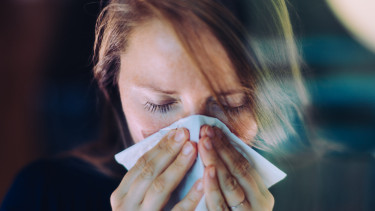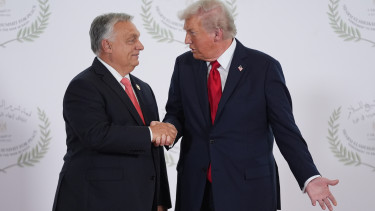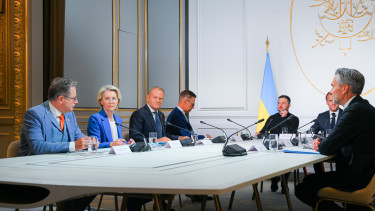COVID-19: Hungary to implement new rules on Monday

The decision has been announced at a press conference held by the Operational Corps on Thursday and a few examples for the tighter mask-wearing rules were later published on the government's official Facebook page.
These are the following:
- Masks will be mandated in restaurants and may be removed only while eating or drinking.
- Covering the nose and mouth will be mandatory in public musical events.
- Those refusing to put on a mask will be refused service, and may be escorted out and charged with committing an offense.
- Businesses are responsible for enforcing the rules and those that do not ensure that customers comply may be closed down.
- Inspection may also be carried out by the police as a commercial authority.
Many countries introduce lockdown measures
German Chancellor Angela Merkel said the country is “in a very serious situation” and announced measures “to avoid an acute national health emergency,” DW reported.
Germany logged a new record in daily coronavirus cases with over 16,700 cases within 24 hours. An estimated 75% of cases cannot be traced anymore, making it difficult to contain the spread.
Germany will implement the following new restrictions for the next month
- Restaurants and bars will close, except for take-away
- Large events will be cancelled again
- Unnecessary travel is strongly discouraged
- Overnight stays in hotels for tourist purposes is banned
- All those who can work from home should do so and employers should ease a transition into working from home
- Meetings in public will be restricted to just two households of up to 10 people total.
- Entertainment facilities such as theatres and cinemas will be closed
- Public recreation centres such as swimming pools, gyms and saunas will be closed
- Tattoo and massage parlours will shut
- No crowds at sports events
- Schools and kindergartens will remain open
- Smaller companies badly hit by the lockdown will be reimbursed with up to 75% of their November 2019 takings
French President Emmanuel Macron has announced a second national lockdown until at least the end of November.
Under the new measures, starting on Friday, people would only be allowed to leave home for essential work or medical reasons. Non-essential businesses, such as restaurants and bars, will close, but schools and factories will remain open. Coronavirus-related deaths in France are at the highest level since April. On Tuesday, 33,000 new cases were confirmed.
New restrictions in France
- People can only leave home to go to work, to go to school, for a medical appointment, to give assistance to loved ones, for essential shopping or for one hour of physical exercise
- People will need to show documentation when leaving the house
- Travel between regions is banned
- Bars, restaurants and nonessential businesses will be closed
- Work must be done remotely wherever possible
- Universities and higher education will mostly be taught online
- International borders will remain largely closed
Scotland is moving to a five tier system of coronavirus restrictions from Monday, as tighter rules are being brought in around the UK, the BBC reported.
Wales is under lockdown until 9 November, and every area of England is now in one of three categories - medium (tier one), high (tier two) or very high (tier three), depending on the local infection rate. Northern Ireland is in the middle of four weeks of restrictions. Schools have closed for a two-week extended half-term break and will reopen on 2 November.
The Spanish prime minister is pushing for a six-month state of alarm to fight coronavirus, but unlike during the first wave, he wants regional leaders to make the hard choices, Politico reported.
Experts have warned that the targeted restrictions taken in recent weeks, including shutting down bars and restaurants in parts of the country and limiting gatherings, are having minimal impact.
The PM wants the “state of alarm” that was reintroduced on Sunday to remain in place until May 9. This, he says, would give legal certainty to regional governments when adopting tougher measures restricting basic freedoms.
Slovakia has also introduced various restrictive measures on 15 October (see list below) and has gone into a state of partial lockdown on Saturday.
- all swimming pools, aqua parks, wellness / fitness centres, cultural performances (cinemas, theatres …) are closed,
- number of customers in shops: max. 1 person per 15 m2; only persons with a body temperature of 37 ° C or less may enter,
- restaurants can serve food and drinks only outdoors (on terraces) and sell take-away,
- mass events can take place only up to 6 people, with the exception of games of the highest sports leagues (hockey, football)
- it is obligatory to have the nose and mouth covered in the exterior, interior and means of public transport,
- people over the age of 65 have dedicated time to shop in grocery stores and drugstores from 9:00 to 11:00 (Monday to Friday); however, they may shop in other time as well.
In the partial lockdown most of the schools in Slovakia have been closed until at least November 27, except for kindergartens and first-level pupils of elementary schools.
The population has also been ordered to respect a curfew and stay at home with a few exceptions: going to work or to the doctor, essential shopping or trips in the nature, taking care of a loved one. Other exemptions include going to the post office, the bank or the petrol station.
The Slovak government has initiated a national testing scheme, requiring its adult population, aged 10-65, to be either tested twice for COVID-19 over two consecutive weekends, free of charge, or complete a 10-day period of home quarantine, Visegrad Insight reported.
The Czech Republic went into lockdown mode again to try and contain the coronavirus.
"From October 22 at 6 a.m. [until November 3 at 11:59 p.m.], free movement of the population will be prohibited, with a few exceptions," it said on Twitter, adding that these include "travel necessary to work, to visit family, to purchase basic necessities, to see a doctor or the authorities."
In addition, non-essential shops will have to close from Thursday, "with exceptions similar to those during the spring measures," such as grocery stores and pharmacies, the government said.
The pressure on Romanian hospitals has never been greater than it is currently, with almost 11,000 COVID-19 patients treated, including 868 in ICUs. The number of new daily confirmed cases first exceeded 1,000 on the last day of September and it has gone up by 1,000 every week since. Nearly 6,500 new cases were logged on Thursday.
President Klaus Iohannis reiterated on Wednesday evening and his words were echoed by Health Minister Nelu Tataru on Thursday that no national lockdown is currently planned, rather they try to contain the spread of the virus locally, on the spots that recorded a surge in the number of new cases.
Cover photo: MTVA/Tibor Oláh by consignment contract









